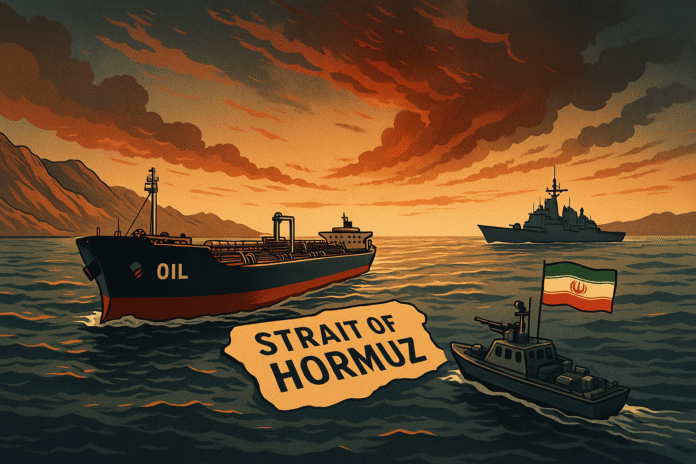It’s easy to overlook a narrow stretch of water on the world map—but the Strait of Hormuz is anything but insignificant. Located between the Persian Gulf and the Gulf of Oman, this slim maritime corridor—just 21 nautical miles wide at its narrowest point—serves as a vital artery for global energy flows. To put this into perspective, nearly 20% of the world’s oil supply—approximately 17 million barrels per day—flows through these waters. It’s not just oil, either. Massive volumes of liquefied natural gas (LNG) also rely on safe passage through the strait.
If this route were to be shut down—whether by war, politics or intentional blockade— the impact would be felt far beyond the region. It would be global, immediate, and deeply disruptive on multiple fronts: economic, geopolitical, and strategic.
Economic Shockwaves: More Than Just Rising Prices
The first and most obvious consequence would, of course, be skyrocketing energy prices. Countries like Saudi Arabia, Iraq, the UAE, and Kuwait move the bulk of their crude oil exports through Hormuz. A blockade would stop supply lines, pushing oil prices through the roof. Some analysts believe prices could surge beyond $150 per barrel if the closure were to last.
But this isn’t just a Gulf-region issue. Energy-hungry nations like India, Japan, South Korea, and especially China—major importers of Gulf oil—would feel the shock instantly. Even countries with backup oil supplies wouldn’t be safe for long. A longer shutdown could push already struggling economies into a serious downturn.
Geopolitical Chain Reactions
Let’s be frank—any closure would almost certainly involve Iran. Geographically and politically, Teheran holds a strong card here. Its Revolutionary Guard Corps (IRGC) has long warned it could shut down Hormuz if pushed too far, and their ships are already active and well-positioned in the region.
If that threat became reality, the U.S.—with its Fifth Fleet stationed nearby—would likely respond with force. European allies like the UK and France, along with regional powers like Saudi Arabia, wouldn’t sit this one out either. What starts as a blockade could escalate quickly into a wider regional conflict, potentially dragging in Bahrein, Yemen, and proxy forces. The result? A Middle East on edge, and international diplomacy under extreme pressure.
Beyond Oil: Trade Disruptions and Unsafe Seas
People often forget that Hormuz isn’t just an energy corridor. It’s also a busy trade route for countless other goods—everything from foodstuffs to industrial equipment. A shutdown would ripple across global shipping networks. Ship insurance would get much more expensive. Trade routes would have to change rapidly. Deliveries would be delayed, and entire supply chains could stall.
Shipping companies might avoid the region entirely, rerouting through longer, more expensive paths. Ports in the Red Sea or the Indian Ocean could serve as backups, but they aren’t equipped to handle sudden surges. Think of the 2021. Suez Canal blockage—now multiply the impact. That’s what we’re looking at.
Are There Alternatives? Yes… But They’re Not Enough
To be fair, some countries have tried to reduce their dependency on Hormuz. The UAE’s pipeline to the Gulf of Oman and Saudi Arabia’s line to the Red Sea offer partial workarounds. But let’s be clear: they cover only a fraction of the total flow that typically goes through Hormuz.
In a crisis, the international community would scramble to keep the strait open. NATO, regional coalitions, and perhaps even neutral actors would step in. There’d be more patrols, more diplomacy, and likely some intense behind-the-scenes negotiations—maybe through Oman, Switzerland, or another trusted mediator.
…to conclude
The closure of the Strait of Hormuz wouldn’t be some isolated regional flare-up—it would be a global emergency. Energy prices would jump, political tensions would rise, and the effects would be felt everywhere—from gas stations to grocery stores.
This possible crisis shows a bigger problem: the world still depends too much on risky, narrow routes. If we want to avoid this scenario, diversification, international cooperation, and proactive diplomacy aren’t optional—they’re essential.
Tamara Ocel













